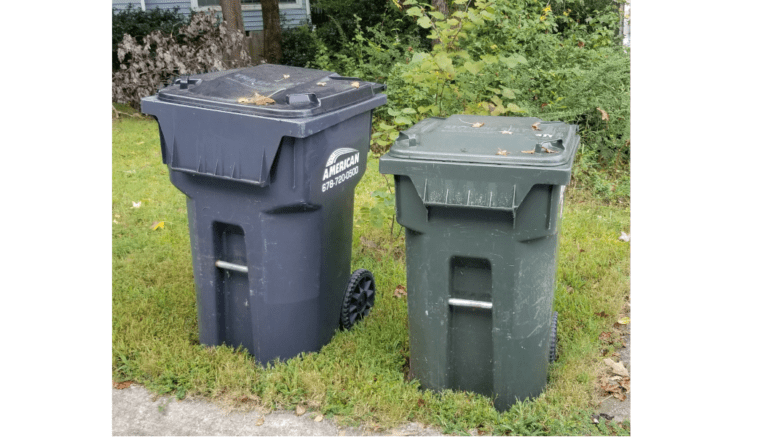[This is an installment in the series “Accidentally car-free” about getting around Cobb County without the use of a car. To see a list of the entire series visit this link. To see how this project began, read the first article in the series by following this link.]
One of the dilemmas in my project of determining the extent to which I can function in Cobb County without the use of a car is the steadily diminishing availability of curbside recycling.
My commitment to avoiding the use of automobiles has its limits. My wife still has a car, and in the extreme cases (medical needs that fall short of calling an ambulance, for instance), I have her car to fall back on.
Recycling might be on that list too if curbside recycling disappears as an option. The trash hauler we use has cut back recycling to twice per month, and they haven’t even been reliable with that schedule.
In the meantime, municipalities in the county are starting to remove curbside recycling from their services.
The City of Powder Springs announced the end of curbside recycling in the city, effective August 31.
The notice on the city website stated:
The City received notice from its recycling provider that the provider was cancelling the contract as a result of significant rate increases that the City was unwilling to place on its customers. At a $200,000 increase in disposal costs, in addition to fuel increases, the resulting rate would have increased customers rates by an additional $3 per month on top of the rate increase already set in place for its regular waste disposal. Rather than an increased monthly fee in addition to the unreliable service experienced and complained about by many customers, the City opted to keep the rate this year at $22.50 per month and accept the notice of termination of curbside recycling.
The City of Kennesaw is also poised to remove curbside recycling from its contract with BFI, the only waste management company to bid on the city’s trash pickup contract.
Kennesaw’s Director of Public Works Ricky Stewart recommended during last Monday’s work session that the city drop recycling from the services because of an addition $5.75 cost per customer that including the service would include.
And the discontinuation of curbside recycling programs is not unique to Cobb County.
Wastedive, a website for the waste management industry, has been tracking the stopping and starting of recycling programs since 2019.
Wastedive wrote:
Waste Dive first launched this tracker in December 2019 following significant market disruptions spurred most notably by scrap import policy changes in China. Cost, contamination and low participation were all common reasons communities gave for pulling the plug on curbside programs. In the months and years that followed, officials announced anywhere from 300 to 3,000 cancellations, but Waste Dive’s tracking indicates a smaller share (more like 100+) of the thousands of active curbside programs were paused or stopped.
So how does this effect the prospects of getting by without a car in Cobb County?
As I wrote earlier, while I’ve lost the use of my own car, I have access to cars, and friends who have offered to help me with rides when needed.
But what does this mean for recycling in parts of the county that have a larger number of no-car households than is typical for Cobb County?
One fantasy solution I’ve often heard is an increase in the number of drop-off locations.
For people with a car, who are environmentally conscious enough to schedule regular trips to a drop-off point that might be an option.
But recycling, like other socially-conscious activities and habits, is sensitive to how easy and cheap it is to do. The chain of desirable outcomes should be that the maximum amount of realistically recyclable material gets picked up, that the materials be professionally sorted, and actually processed and recycled.
Local governments have little control over what happens to the materials when they are shipped off for processing.
But there is some leverage in terms of making certain that curbside pickup is available at a reasonable cost (even where there isn’t service directly run by a municipality).
There is a lot I don’t yet know about the recycling system
The decline of curbside recycling opens up a lot of questions that I intend to find out about, but don’t yet know. Most of these things are separate from the issue of widespread availability of curbside recycling.
- What percentage of households that have curbside recycling available use it?
- What will the end to curbside recycling mean for the percentage of recyclable material that gets put into the processing system?
- What percentage of materials that are currently collected by all means (drop-off points, curbside recycling) get efficiently processed into usable forms?
- On balance, how does curbside pickup by a truck on a fixed route compare to trips by car to a recycle center in terms of environmental impact? (I have a similar question in terms of the net impact of grocery services like Instacart)
At this point I don’t even know the path that, for example, a sheet of cardboard takes once it leaves my house.
Those are things I intend to find out, and if any readers out there know of good current resources for learning about the life-cycle of recyclable material, email them to me at larry.johnson@cobbcountycourier.com.
In the meantime, I’m just happy that my trash hauler still includes recycling as an option, even if it’s a bit unreliable.

